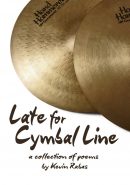
Book Review: Late for Cymbal Line by Kevin Rabas
Reviewed by Tyler Sheldon

Late for Cymbal Line
Poetry by Kevin Rabas
Local Gems Press, June 2017
$12, 72 pp.
ISBN-13: 978-1946642073
Kevin Rabas’s Late for Cymbal Line explores struggles for acceptance through various life stages (young adulthood, marriages, and so on) in an attempt to define a sometimes difficult life and career. In the opening poem, “Uneven Souls,” the narrator asks, “What can you see, staring into the darkness?” The introspection that follows throughout Late for Cymbal Line reveals internal darkness gradually—childhood bullying, the aftereffects of a life-altering head injury, and the eventual discovery of fulfillment through music and healthy relationships. The opening poem elaborates on the ghosts that haunt the narrator and surely others like him; he sees “your ex-wife’s name, your own particular sadness, your own / blue eye ocean, salt on your cheek, salt on / your lip and your chin; everything you regret.” Dealing with unfortunate circumstances, and transforming them over time into cathartic moments, is a central theme of this collection.
The narrator cuts right to one of these larger issues in “Got Knocked Down,” where he describes a basketball game gone awry: “I got knocked down, knocked down / in a pick up basketball game, / he was bigger than me,” the speaker confides. “And when my head hit / those blonde boards, my brain / bounced and rattled in my skull.” A catharsis of sorts occurs when the speaker’s mind is instantly filled with color and sound:
salt god, god of light
and every color: violet & amber & umber;
emerald & ruby & agate blue,
sound of surf & grey rain.
These stimuli are revealed later as harbingers of trauma, but for these few moments the narrator is more at ease than on edge.
Later in the collection, hope and dejectedness mix through music. In “Tip Cup #2,” the narrator and his guitarist learn the limits of subject matter and taste: “We play / Dave Matthew’s ‘Crash,’ / & are not asked back.” The speaker says, “[m]y brushes bent, / we come and go, / like sons that limp home and don’t look back.” Later, the title poem describes a more fortunate happening with his foray into college marching band. When studying creative writing the narrator oversleeps, and is late for a 5:30 AM rehearsal. When he makes it just in time by scrambling onto the field over a barbed-wire fence, relief and triumph are mixed with (literal) pain: “Two tunes in, and I notice a coolness along my arms. I’m / dripping blood.”
Smaller moments give evidence of positivity in less-than-ideal circumstances. In “Little Fish Dinners,” the speaker describes working around a sister’s eating habits: “Alicia’s vegetarian, and had no / meat in her fridge, and so I made a deal with myself: what I / could catch by fishing, I would eat.” Though unorthodox in the end, this method still works surprisingly well. The speaker indeed subsists better than those around him, with “the fish wrapped in tin foil / and cooked over a campfire out back.” Like other points in Late for Cymbal Line, this poem shows a character ready to compromise for beneficial results, and willing to see past moments that knock him down.
In rhythmic and emotionally charged poems, Rabas shows that bouncing back is always possible—no matter how doing so strains the mind and body. In “Guitarist Ken,” the narrator notes that sometimes these hard-edge moments are inevitable. Our personal world frequently “falls apart, as it sometimes does,” but “things dissipate,” too. Late for Cymbal Line hinges on the liminal moment between these impulses: when we decide how best to right ourselves, and how to carry forward.
Tyler Sheldon is a Pushcart Prize nominee and the author of First Breaths of Arrival (Oil Hill Press, 2016) and Traumas (Yellow Flag Press, 2017). His poems, fiction, and reviews have appeared in Quiddity International Literary Journal, Coal City Review, The Prairie Journal of Canadian Literature, The Dos Passos Review, Entropy Magazine, and other publications. He earned his MA in English at Emporia State University, where he studied with Kansas Poet Laureate Kevin Rabas, and is currently an MFA candidate at McNeese State University.

Leave a Reply